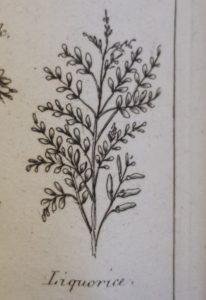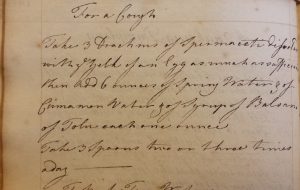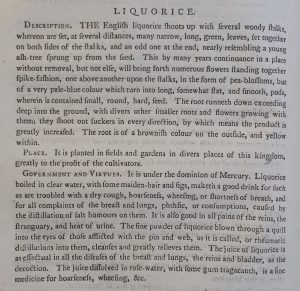November 21, 2016, by Kathryn Steenson
A spoonful of spermaceti helps the medicine go down
It’s that time of year when coughs, colds and flu are doing the rounds. But how did our ancestors cope with ill-health, before the days of ready-prepared pills and potions from the local shop?
Manuscripts and Special Collections holds a number of works with useful recipes to be made at home – some possibly more efficacious than others! This one is from Gervase Markham’s 1683 volume A Way To Get Wealth (Book 2 pg 17, Special Collection S509.M2 barcode SC2475):
For a dangerous cough
Take Aquavitae [concentrated aqueous solution of ethanol] and Salt, and mix with it strong old Ale, and then heat it on the fire, and therewith wash the soles of the feet when you go to bed.
Markham (c.1568 – 1637) was born the third son of Sir Robert Markham of Cotham in Nottinghamshire was a soldier, poet and writer. He had no formal training as a doctor or apothecary, but took an interest in agriculture and animal husbandry, so would have been familiar with herbal remedies.
It’s unlikely that washing the feet with salty alcohol would help a cough, but it is a much more pleasant remedy than this one from Margaret Willoughby (c.1713-1795). She was the daughter of a London sculptor, and in 1736 she married Edward Willoughby and moved to Aspley, Nottinghamshire. As the mother of six children, she undoubtedly took a great deal of interest in home remedies for childhood colds and sniffles. This recipe for cough medicine is one from of her household books (MS 87/1, page 18) that contained a mix of food and medicinal recipes, all neatly written and indexed. Some of them appear to be contributed by other women, suggesting friends and relatives swapped recipes and cures in much the same way people do today.
For a Cough
Take 3 Drachms of Spermaceti distorted with the yolk of an Egg as much as sufficient then add 6 ounces of Spring Water & of Cinnamon Water & of Syrup of Balsam, & of John each one ounce.
Take 3 spoons two or three times a day.
It sounds awful. By the second or third dose you could probably convince yourself you were no longer ill enough to need it.
Many of these remedies used easily-available natural ingredients that had been used in folk medicine for centuries. In 1652 Nicholas Culpeper (1616-1654) published The English Physitian, an ‘astrologo-physical discourse of the vulgar herbs of this nation’, explaining how to identify, prepare and use many common plants for medicinal purposes, based upon his knowledge of herbal medicine and medical astrology. Under this belief system, the twelve astrological signs were closely associated with different parts of the body, and influenced various diseases and treatments.
Medical astronomy is now discredited as pseudoscience, but was a widespread practice in medieval and early modern times. Flawed as his ideas were, it was his methods rather than his ideas that made Culpeper deeply unpopular amongst his peers. Culpeper deliberately published his books in vernacular English and kept them inexpensive to enable the poor to access treatment without resorting to expensive physicians and apothecaries. He believed the health of the population could be improved by educating people, including how to use the herbs and plants freely available in the countryside.
The Society of Apothecaries was displeased, but were ultimately unable to prevent him publishing a number of medical texts. Our copies of The English Physitian or Complete Herbal, as it came to be known (Special Collection RS177.G7 CUL, barcode SC124161), are from the eighteenth century, and popular demand ensured that the book was never out of print.
Culpepper believed that colds were caused by ‘an obstruction of perspiration’. He noted – somewhat more correctly – that:
Would people sacrifice a little time to ease and warmth, and practice a moderate degree of abstinence [from large quantities of solid food and strong liquor] when the first symptoms of a cold appear, we have reason to believe that most of the bad effects…might be prevented…People affect to treat them with so much indifference and neglect, merely because they are only colds.
Along with rest and a moderate diet, Culpeper recommended various plants that may help. A drink of licorice boiled with figs in water was used to treat dry coughs, hoarseness and wheezing, as was lung-wort, although Culpeper also recommended boiling it in beer to treat ‘broken-winded’ horses. This is a chronic respiratory condition similar to allergic bronchitis. A better treatment is preventing further exposure to the allergen. Culpeper’s remedies sound much more palatable than Margaret Willoughby’s concoction, but were probably as ineffective.

Liquorice: a blue-flowered, brown-rooted plant under the dominion of Mercury, as pictured in Culpeper’s ‘English Physician’
To see these books, please contact us to make an appointment to visit our Reading Room on King’s Meadow Campus. We have a vast collection of health and medicine-related rare books and manuscripts, including the Medical Rare Books Collection, the Nottingham Medico-Chirurgical Society Library, and various Nottinghamshire Hospital archives.
If you’re looking for medical advice, then a much better source of information is the NHS Choices website.
No comments yet, fill out a comment to be the first




Leave a Reply